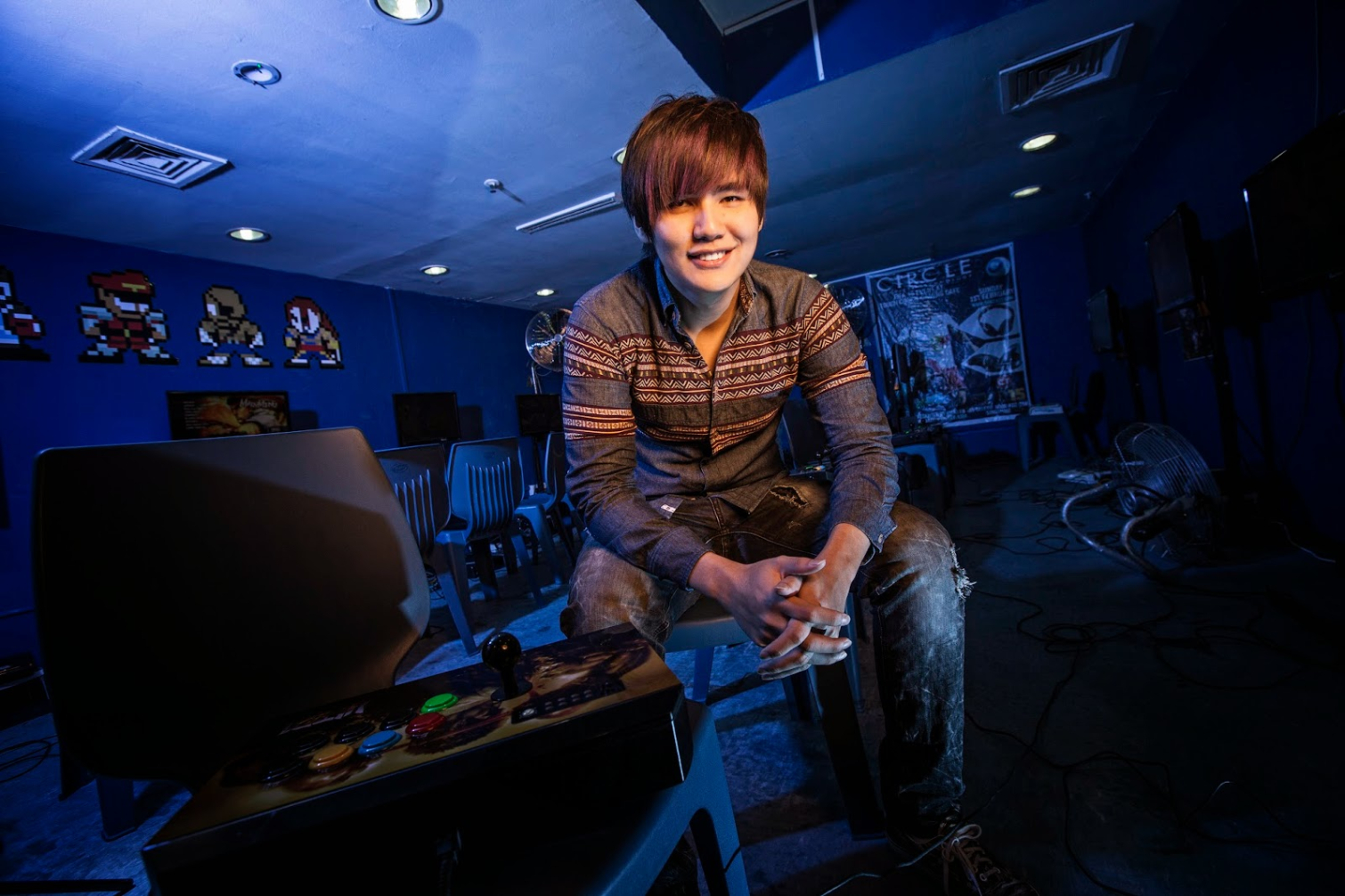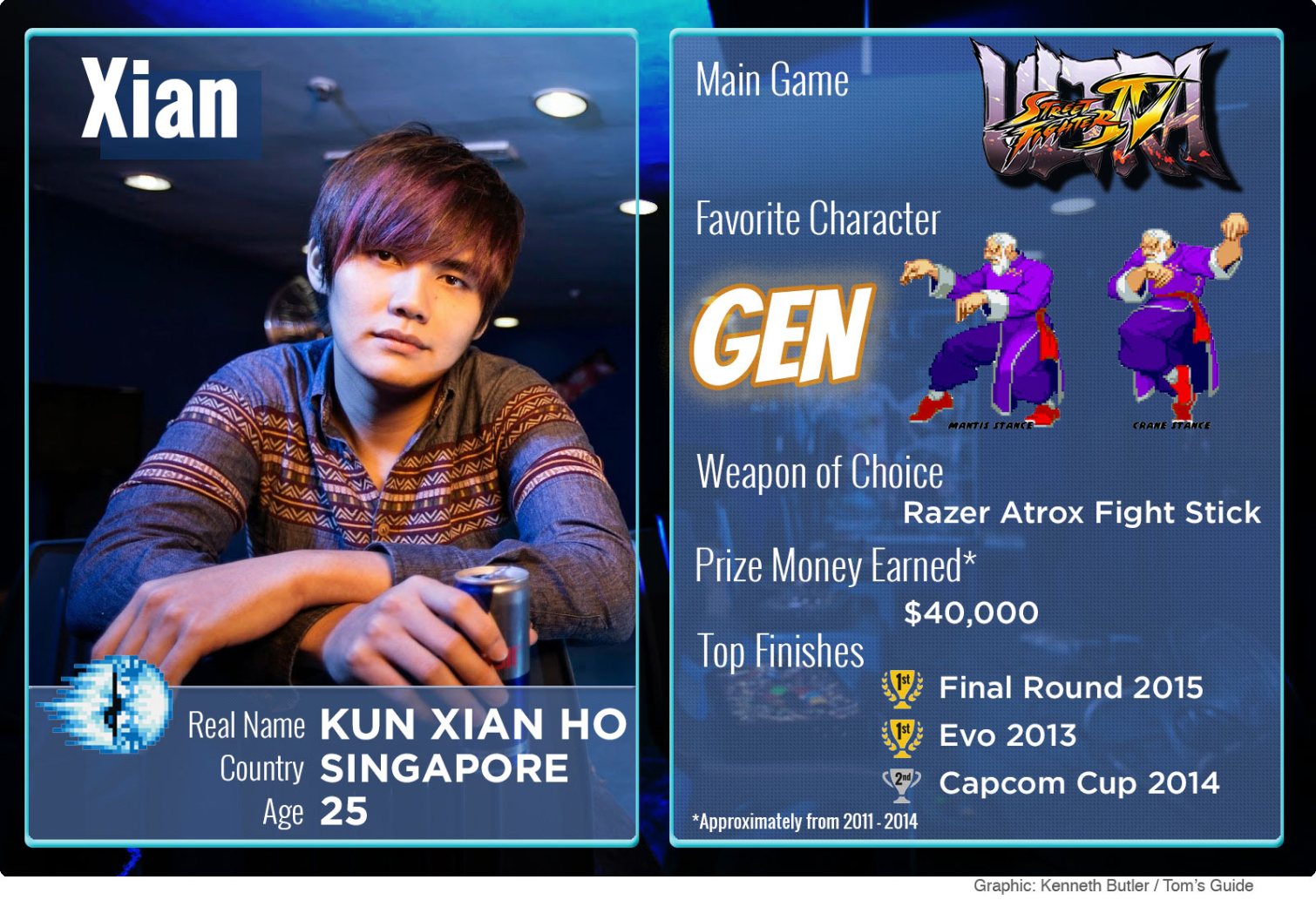What I Learned By Losing to a Street Fighter Champ
One of the best fighting game players in the world, Xian talks about his winning strategies and the future of eSports.

For the next few minutes, Xian must remain calm. He's done his homework. He's studied his opponents and practiced hard. Taking a deep breath, the Singaporean Street Fighter player grabs the gaming stick, the controller with which he maneuvers his in-game character Gen. He can barely hear the thunderous cheering in the arena. Thirty-three thousand dollars are at stake, and he cannot make a mistake.
Welcome to the world of competitive gaming, where the stakes are high, the players run the gamut from scrawny to studly, and sitting in front of your computer is a legitimate sport. The same components are there: teams, rivalries, adoring fans, leagues, world rankings, stadium-like arenas and a ton of money up for grabs.
If you're well-versed in the competitive gaming scene, you might have heard of Xian (sounds like see-an). The 25-year-old Singaporean, whose real name is Kun Xian Ho, is one of the most prolific fighting gamers today, having won the Evo fighting game tournament in 2013 and placing in the finals of many others since.
MORE: The Best PC Games of the Year
Xian has made a career for himself by excelling in such fighting games as King of Fighters and Street Fighter. But it wasn't easy.

"It's a road that no one will ever want you to try," he told me. "People don't believe someone from Singapore can go overseas and win tournaments.
Xian started playing games at the tender age of 6, when he tried out King of Fighters. He turned competitive in 2011, using his own savings to pay for a flight from Singapore to Las Vegas for Evo 2011.
Get instant access to breaking news, the hottest reviews, great deals and helpful tips.
"At that time, the prize money was really small," Xian recalled. "Less than my air ticket."
But things are changing.
A Lucrative Industry
Prize money for major gaming competitions has been growing rapidly. Last year, winning first place at the major fighting game competition Capcom Cup would have earned you $33,000. This year, the champ will walk away with $125,000, Xian said.
And that's just for the relatively minor fighting games scene. For more popular MOBA (Multiplayer Online Battle Arena)-type games such as Dota 2 (Defense of the Ancients), winning teams get millions of dollars.
MORE: Most Anticipated Games
Last year, a total of $11 million was up for grabs in The International, a Dota 2 tournament in Seattle. The victorious five-person team took home $1 million each. That's the biggest-ever reward for competitive gaming, also called eSports. This year, the prize pool, which is crowdfunded, has already grown to $18 million. And that's just one tournament.
Money pours into these competitions from large sponsors such as Nvidia, Intel and Sony, who for years have garnered massive profits from their gaming products. Sponsoring these tournaments means more exposure of their brands to an audience of millions who either watch these games live or tune in to online streams.
It's no wonder that the competitive gaming scene is growing. Those who already love games may even start wondering if they could reel in the big money by going pro. But they might want to think twice.
Not As Easy As I'd Thought
I learned the painfully embarrassing way that making a career out of gaming is not as easy as it sounds. I challenged Xian to Ultra Street Fighter 4, a game I had never played before. I was cocky enough to think that my childhood experience with the first Street Fighter game (and that I tied my hair up in Chun Li buns) would be all that I needed to survive.
To no one's surprise but mine, I suffered a humiliating, crushing defeat in my first round with Xian, which lasted all of 24 seconds. His character Gen literally wiped the floor with my Chun Li.
After several rounds, it dawned on me that being good at a fighting game wasn't just about your ability to quickly mash a bunch of buttons on a controller. Xian was not just anticipating my moves and blocking them, but also analyzing my weaknesses and attacking where my guard was down.
As Chun Li, I loved rapidly kicking my opponent, but that required getting close. Thus, Xian frequently dealt me blows from far away, keeping his distance. He was swift-fingered enough to execute his moves instantly and effectively. I, on the other hand, was struggling just to figure out how to block him. Spectators who had tuned into our game via Twitch offered me all kinds of advice, but I couldn't even follow.
Of course, taking on a noob like me is child's play for a pro like Xian. But he also destroyed my colleagues Michael Andronico and Sam Rutherford, both of whom are more familiar with fighting games. Andronico even plays Ultra Street Fighter 4 regularly.

Before a big competition, Xian has a lot of homework to do. He watches hundreds of videos of opponents to learn their strengths and weaknesses. Then he practices against various characters to get better against them. "The more I practice and watch videos, the better," he said.
Xian counts players such as Evo 2015 winner Momochi, Japanese gamer Daigo and Infiltration (from Korea) among his biggest rivals. But they're also his favorite players ─ he's admired them since he started competitive gaming.
According to Xian, there aren't any fierce rivalries in fighting games. "I don't have [them]," he said. "Outside of the game, we are actually quite friendly. We eat together, we say hi."
The New Basketball or Soccer?
Although going pro is no easy feat, Xian is optimistic about the future of gaming. "I can see gaming becoming a career in the future because of the amount of prize money coming in," he said.
Some schools in Sweden are even adding eSports to the curriculum, while New York University has an Intro to Starcraft course, teaching today's kids how to excel in this growing field. Xian believes the next generation will see a growth in the gaming population.

"People had no choice in the past but to play basketball, soccer," he said. "Now, games have become something that can satisfy your competitive need to win." This thirst for victory is what will drive pro gamers to keep pushing ahead.
"If you aren't competing in anything in your life, you will feel very empty," Xian said. "When you win something, you will feel a sense of achievement. Games are a way for you to do that."
That's good news for gamers everywhere. But after my thrashing I'll stick to reporting and writing.
Cherlynn is Deputy Editor, Reviews at Engadget and also leads the site's Google reporting. She graduated with a Master’s in Journalism from Columbia University before joining Tom's Guide and its sister site LaptopMag as a staff writer, where she covered wearables, cameras, laptops, computers and smartphones, among many other subjects.

